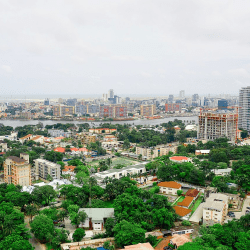The New Atlas Cove jetty in Lagos is a groundbreaking project that has significantly advanced Nigeria’s oil and gas sector infrastructure. Constructed under an EPC (Engineering, Procurement, and Construction) contract, this berthing and offloading facility is designed to handle vessels of up to 50,000 DWT (Deadweight Tonnage), making it a vital asset in Nigeria’s petroleum logistics and a pivotal entry point for fuel imports and exports. The jetty is equipped with two expansive platforms and a 520-meter-long access trestle, engineered to support essential infrastructure, including a service road and pipe racks for safe and efficient fuel transport.
Strategic Importance of the New Atlas Cove Jetty in Nigeria’s Energy Landscape
Located within the Lagos harbor basin, the Atlas Cove jetty serves as a critical infrastructure point for Nigeria’s energy logistics. This new facility strengthens Nigeria’s capacity to manage large-scale fuel imports and distribution, aligning with the country’s goal to maintain a steady energy supply for its growing population and industries. As one of the primary receiving points for fuel and petroleum products, the jetty provides improved efficiency and operational reliability, significantly enhancing the energy supply chain’s overall stability.
Engineering Excellence in Oil and Gas Sector Infrastructure
This project exemplifies Julius Berger’s expertise in designing and constructing over-water structures for the oil and gas industry. The complexity of building a 50,000 DWT-compatible jetty within a high-traffic harbor required innovative engineering solutions to address environmental, logistical, and structural challenges. Key components of the project include:
- Dual Platform Design: The jetty features two substantial berthing platforms, each constructed to withstand the operational demands of large oil and gas tankers. These platforms allow simultaneous operations, improving throughput and reducing berthing time for vessels.
- 520-Meter Access Trestle: The access trestle, stretching over half a kilometer, provides a stable connection between the platforms and the shore. Its design incorporates a service road for operational access and pipe racks essential for the safe and efficient offloading of petroleum products. This layout optimizes both accessibility and safety for personnel and equipment.
- Over-Water Construction Expertise: Julius Berger’s proficiency in over-water construction enabled the successful completion of the jetty. Working within the harbor’s unique tidal conditions required precise planning, advanced materials, and construction methods adapted to the dynamic marine environment, ensuring long-term durability and safety.

Enhancing Nigeria’s Fuel and Energy Distribution Capacity
The Atlas Cove jetty’s high-capacity design improves Nigeria’s ability to import and distribute petroleum products more effectively, addressing a crucial need within the country’s energy sector. By enabling the docking and offloading of large vessels, the facility reduces waiting times, minimizes transport costs, and supports more efficient fuel distribution across Nigeria’s coastal and inland regions. This infrastructure is vital for sustaining the country’s growing energy demands, directly impacting industrial activities, transportation, and household energy access.
Julius Berger’s Role in Advancing Oil and Gas Infrastructure
As an industry leader, Julius Berger’s role in the construction of the Atlas Cove jetty reinforces its reputation for delivering high-quality infrastructure projects in complex environments. The EPC contract for this jetty highlights Julius Berger’s comprehensive capabilities in project execution, from engineering and procurement to full-scale construction. Julius Berger’s work on the jetty exemplifies the company’s commitment to safety, efficiency, and environmental stewardship, demonstrating its ability to meet the rigorous demands of the oil and gas sector.
Commitment to Safety and Environmental Standards
The construction of the Atlas Cove jetty was carried out with a strong focus on safety and environmental impact management. Each phase adhered to industry standards for marine construction and environmental protection, minimizing the project’s ecological footprint. The design includes integrated safety features, such as spill prevention mechanisms and secure pipe racks, to safeguard both personnel and the surrounding marine environment. These measures ensure that the jetty operates sustainably while supporting Nigeria’s energy infrastructure.











